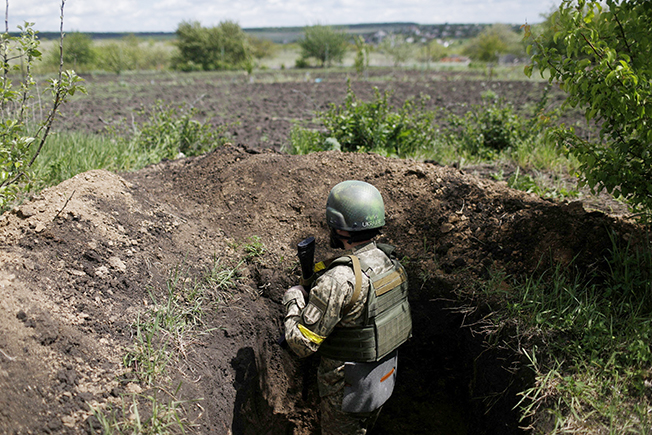Vladimir Putin appeared to climb down on Monday from Russia’s objections to Sweden and Finland joining NATO, saying Moscow had no issues with them entering the U.S.-led military alliance they now aim to join in reaction to his invasion of Ukraine.
Though the Russian leader said Moscow would take action if NATO were to move more troops or hardware onto the territory of its new members – steps Finland and Sweden have both already ruled out – he said NATO’s expansion itself was not a threat.
“As far as expansion goes, including new members Finland and Sweden, Russia has no problems with these states – none. And so in this sense there is no immediate threat to Russia from an expansion to include these countries,” Putin said.
The comments appeared to mark a major shift in rhetoric. For decades, Moscow has cast NATO enlargement as a direct threat to Russia’s security, including citing it as a justification for the invasion of Ukraine itself.
Just hours before Putin spoke, Russia’s deputy foreign minister, Sergei Ryabkov, said Finland and Sweden were making a mistake that would have far-reaching consequences: “They should have no illusions that we will simply put up with it.”
Putin’s own spokesman Dmitry Peskov, asked last Thursday if Finland joining NATO was a threat to Russia, had said: “Definitely. NATO expansion does not make our continent more stable and secure.”
But faced with the prospect that his own actions may cause the very expansion of NATO he had opposed, Putin appears to have decided not to object directly.
He did however say NATO enlargement was being used by the United States in an “aggressive” way to aggravate an already difficult global security situation, and that Russia would respond if the alliance moves weapons or troops forward.
“The expansion of military infrastructure into this territory would certainly provoke our response. What that (response) will be – we will see what threats are created for us,” Putin said. “Problems are being created for no reason at all. We shall react accordingly.”
Both non-aligned throughout the Cold War, Finland and Sweden say they now want the protection offered by NATO’s treaty, under which an attack on any member is an attack on all.
“We are leaving one era behind us and entering a new one,” Swedish Prime Minister Magdalena Andersson said, announcing plans to formally abandon the militarily non-aligned status that has been a cornerstone of Swedish national identity for more than 200 years. “NATO will strengthen Sweden, Sweden will strengthen NATO,” she said.
Swedish and Finnish officials have said Putin has only himself to blame for their decisions to join NATO. Former Swedish Prime Minister Carl Bildt tweeted a picture of a mock award for Putin as “NATO salesman of the year”.
Kjell Engelbrekt, professor of political science at the Swedish Defence University, said Putin appeared to be trying to “limit the damage”, though it was too early to say whether he now accepted NATO’s expansion as “a fait accompli”.
Moscow now had few military options left to follow through on its previous “very assertive” rhetoric demanding the Nordics never join NATO, Engelbrekt said.
“Given that Russian military resources are fairly stretched or even overstretched at the present time … they could not match an intensification of the rhetoric with the stationing and distribution of more capabilities in this part of Europe anyway.”
Finnish and Swedish accession would radically redraw the strategic map of northern Europe, giving NATO control of nearly the entire Baltic Sea coast and more than doubling the alliance’s land borders with Russia.
In St Petersburg, a few hours drive from the Finnish border, Larisa worried it would sour relations between Russians and Finns and Swedes: “Maybe they just don’t understand it. But we understand pretty well – it’s just suicide for them and us.”
A senior U.S. official, speaking on condition of anonymity, said Washington had seen no indications Russia was moving troops or equipment closer to the border with Finland.
UKRAINE TROOPS REACH BORDER
The Ukraine invasion, now nearly three months old, has so far been a military disaster for Moscow, with its troops forced out of the north and the environs of Kyiv in late March. A Ukrainian counterattack in recent days has driven Russian forces out of the area near Kharkiv, the biggest city in the east.
Ukraine’s defence ministry said on Monday the 227th Battalion of the 127th Brigade of Ukraine’s Territorial Defence Forces had advanced all the way to the Russian border, which is about 40 km north of Kharkiv.
In a video message, President Volodymyr Zelenskiy hailed the achievement and thanked the troops: “I am very grateful to you from all Ukrainians, from everyone, from myself, from my family, my gratitude is unlimited. I wish you all health, take care of yourselves. Thank you, your parents. You are great.”
The successes near Kharkiv could let Ukraine attack supply lines for Russia’s own main offensive, grinding on further south in the Donbas region, where Moscow has been launching mass assaults for a month achieving only small gains.
The governor of the Luhansk region in Donbas, Serhiy Gaidai, said the situation “remains difficult”, with Russian forces trying to capture the town of Sieverodonetsk.
In the south, fighting was raging around the Russian-held city of Kherson, and Russian missiles struck residential areas of Mykolayiv, the presidential office in Kyiv said.
NATO Secretary-General Jens Stoltenberg said on Sunday Ukraine could win the war, an outcome few military analysts predicted when Russia invaded Ukraine.
Two Western companies in Russia announced high profile plans to sell up. Renault said it was selling its majority stake in Russia’s biggest Soviet-era carmaker Avtovaz to a Russian science institute for a symbolic single rouble.
McDonalds, whose opening in Moscow in 1990 was an emblem of the Cold War’s thaw, said it would exit too. A source said its restaurants would be sold to a Russian owner and reopen with no McDonald’s branding.







Click here to change your cookie preferences